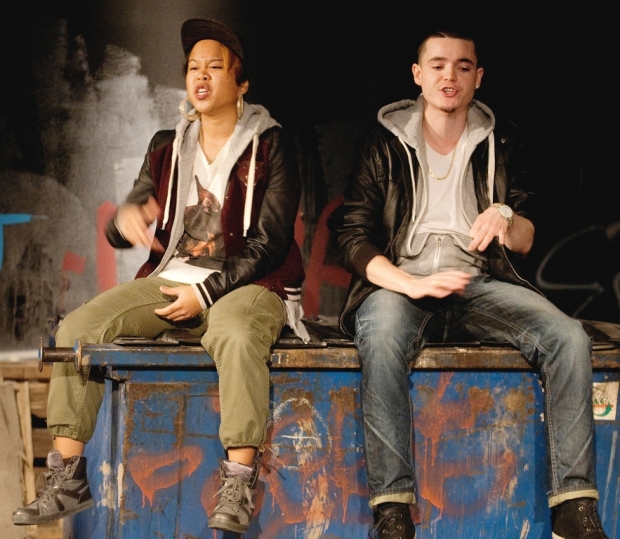The history of racial relations in North America has certainly been a topic of interest among filmmakers and playwrights in recent years—one which audiences have been happy to engage in. One need look no further than the recent successes of Django Unchained, Fruitvale Station, or the buzz around 12 Years a Slave to see the fascination the issue has provoked. It’s no small feat then that Omari Newton’s play Sal Capone: The Lamentable Tragedy of showcases a powerful new perspective on the subject, giving consideration to multiple viewpoints without concealing the vehement anger underneath.
As the audience enters the theatre to the sound of gunshots, sirens, and Pusha T’s “Numbers on the Boards,” it’s easy to miss the title character (played by Tristan D. Lalla) sitting with his head enveloped by a hoodie on one of the benches that compose most of the sparse set. It’s a powerful decision by director Diane Roberts that indicts the audience of ignoring black youth without feeling didactic.
Once the lights go down and the play actually begins, Lalla is far from inconspicuous. He brings a righteous fury to Sal—also referred to by his birth name, Freddy—that matches the ire in Newton’s script. He’s particularly strong in the slam poetry-esque soliloquies which serve the multiple functions of developing his character, promoting a political agenda, and comprising a good deal of the play’s diegetic music. It’s a credit to Newton’s versatility that the musical numbers are compelling enough to not feel like mere plot devices.
This isn’t to imply that the music is all that’s interesting about Sal Capone. The story, narrated by First Nations drag queen Shaneney (played by Billy Merasty) concerns Freddy and the hip-hop group he has with his two friends Jewel and Chase (played by Kim Villigante and Jordan Waunch). When their DJ and friend Sam is shot nine times by the police, they find themselves in a quandary—do they go through with their album release party or put it off in Sam’s honor?
At this point, the play splinters off into conversations between various groupings of the characters, which shed light on different reactions by minorities to oppression. Freddy responds to the violence by isolating himself in his room and composing reactionary lyrics which shock and offend his sister Naomi (played by Letitia Brooks). With her character, however, Newton’s writing falls short of the depth which he affords the rest of the cast—his portrayal of Naomi verges on caricature throughout the play. Though Naomi’s resistance to protest forms an interesting contrast with Freddie’s rebelliousness, her plucky obstinance doesn’t quite yield a fully believable character.
However, Naomi’s one-dimensional nature is more than made up for by Jewel’s multivalent vibrancy. Villagante herself is an up-and-coming rapper, and her skill and energy could easily make her a future star. She brings an exuberance to Jewel, who subsequently steals many of the scenes she’s in.
Sal Capone is an angry play, though Newton’s rage—for the most part—doesn’t get in the way of his intelligence. It’s hard to gauge how large of an audience will be drawn to a play that reaches conclusions as grim as this one does about North American racial relations. Though there has been a vogue for works on race recently, most of them either don’t come from a black perspective or don’t have the fury lurking beneath them that Sal Capone does. However, Spike Lee proved with Do the Right Thing that a black artist can turn his indignation into something that will resonate with a large audience, so hopefully Sal Capone can find similar success.
Sal Capone: The Lamentable Tragedy of is being shown until Nov. 10 at MAI (3680 Jeanne-Mance). Performances will be held at 8 p.m. Wed.-Sat. and at 3 p.m. on Sunday matinees. Student tickets are $20.








